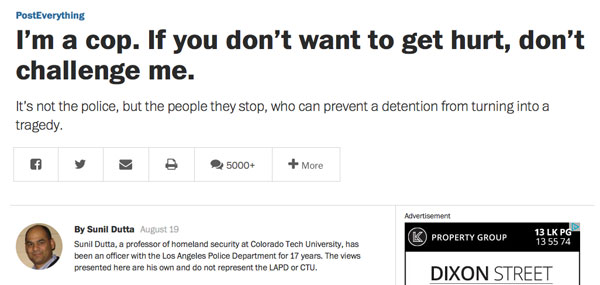An American police officer and ‘professor of homeland security’ has provoked an angry response after penning an op-ed defending the use of lethal force by police in the wake of the killing of two men and ongoing unrest in Ferguson, Missouri.
Drawing on his personal experience, Sunil Dutta argued in the Washington Post yesterday that violent confrontations between police and the public could be avoided if people acted in subservient manner towards police.
“… if you don’t want to get shot, tased, pepper-sprayed, struck with a baton or thrown to the ground, just do what I tell you,” Dutta wrote.
“Don’t argue with me, don’t call me names, don’t tell me that I can’t stop you, don’t say I’m a racist pig, don’t threaten that you’ll sue me and take away my badge. Don’t scream at me that you pay my salary, and don’t even think of aggressively walking towards me.
“Most field stops are complete in minutes. How difficult is it to cooperate for that long?”
In the article, Dutta said people who were having their civil liberties violated during arrest should simply wait through the process and lodge a complaint later.
The piece has provoked an angry backlash in a country still torn by the death of 18-year-old Michael Brown.
An African-American, Brown was shot dead by a police officer in the town of Ferguson on August 9, causing racial tensions to erupt and bringing issues of racial and economic division to the surface of the American media.
Brown was unarmed at the time he was shot, and though police have claimed he was involved in a scuffle with an officer, witnesses have said he was killed while trying to surrender, with his hands held above his head.
Relatives claim an autopsy confirms the latter account.
The shooting of Brown followed the death of New York man Eric Garner, who was killed while being arrested for allegedly selling illegal cigarettes.
Like Brown, Garner was unarmed when he was put into a chokehold by police. Video of the incident shows Garner begging police not to arrest him, then repeatedly warning that he could not breath.
A medical examiner found Garner died as a result of the compression of his neck and chest that took place during the arrest.
With tensions between police and the African-American community in particular running high, Dutta’s piece soon drew the ire of other commentators.

Writing for D.C. based magazine the Washingtonian, Benjamin Freed took issue with Dutta’s assumption that those subject to police abuse are provided with realistic avenues for recourse.
“In DC, for instance, only 66 of the 358 complaints filed last year against Metropolitan Police Department officers were sustained, according to figures released this week,” Freed wrote.
In the Atlantic, Conor Friedersdorf accused Dutta of ignoring basic conventions on proper policing.
“What Dutta's op-ed illustrates most clearly is how far some American police officers have drifted from a seminal document in policing theory that has been cited by numerous observers of militarized law enforcement in Ferguson, Missouri.”
Police in Ferguson have come under increased pressure since the Brown killing after breaking up protests and arresting journalists, forcing some to sue police to allow them to continue recording events in the town.
Referring to his time in the LA police force, Dutta said he had often used restraint under pressure.
“Working the street, I can’t even count how many times I withstood curses, screaming tantrums, aggressive and menacing encroachments on my safety zone, and outright challenges to my authority. In the vast majority of such encounters, I was able to peacefully resolve the situation without using force.”
Dutta’s association with the LA police is unlikely to sooth his critics, however.
The force has a storied history of racial violence, including the 1992 beating of African-American Rodney King, which fuelled protests and riots in LA not dissimilar to the current unrest in Missouri.
The officers tried for the incident were all acquitted on charges of police brutality.
Donate To New Matilda
New Matilda is a small, independent media outlet. We survive through reader contributions, and never losing a lawsuit. If you got something from this article, giving something back helps us to continue speaking truth to power. Every little bit counts.



